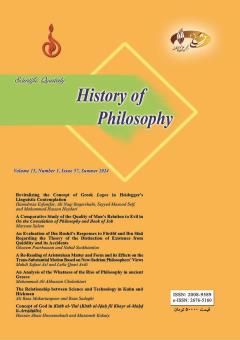A Comparative Study of the Quality of Man’s Relation to Evil in On the Consolation of Philosophy and Book of Job
Subject Areas : Geneology of philosophical schools and Ideas
1 - Assistant Professor, Philosophy and Kalam Department, Faculty of Theology and Religious Studies, Shahid Beheshti University, Tehran, Iran
Keywords: Job, Boethius, On the Consolation of Philosophy, Book of Job, fate,
Abstract :
In On the Consolation of Philosophy, in line with Stoics, Boethius explains the nature of evil, the quality of the interference of the divine providence in the world, and the relationship between evil and destiny following a philosophical approach. In this book, evil is considered to be necessary for a changing material world. True happiness, which cannot be realized in an unstable world, is the same Pure Good or God. He also states that with Man’s becoming divine all evil things and pains are weakened and become good. In this approach, Man plays no role in creating evil. The same view of evil can also be witnessed in the Book of Job. At the beginning of the book evil is sometimes considered to be the effect of Man’s sins, sometimes an educational element for Man’s avoiding sin, and sometimes a divine test to confirm insistence on piety. However, at the end of the book, it reads that evil basically lacks an external existence so that it would require a cause. An analysis of these two books demonstrates that in both of them all divine acts are good and, by submitting to God’s Will, Man turns the excruciating pain of some divine acts that annoy him into sweetness.
